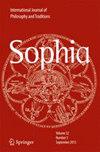上帝、Īśvara 和梵:后先验比较神学的一个案例
IF 0.5
3区 哲学
0 PHILOSOPHY
引用次数: 0
摘要
尽管在学术著作和信仰团体中,上帝和 "Īśvara "或 "梵 "这两个范畴之间存在着共同的交流,但来自两种不同文化的这些绝对概念之间却存在着更深层次的、不可调和的差异。将文化视野拉平的天真做法所造成的混乱多于文化和谐。任何建立在误解基础上的文化认同都注定是失败的,如果我们要寻求文化理解的基础,我们就必须承认它们背后的差异。本文试图通过研究两种文化的绝对性来强调其核心差异。本文章由计算机程序翻译,如有差异,请以英文原文为准。
God, Īśvara, and the Brahman: A Case for a Post-Perennial Comparative Theology
Even though we encounter a common exchange between the categories of God and Īśvara or the Brahman in both scholarly works and faith communities, there are deeper and irreconcilable differences in these absolutes from two different cultures. A naive approach to flatten the cultural horizons has engendered more confusion than has created a cultural harmony. Any cultural acceptance based on misconceptions is destined to fail and if we seek to ground cultural understanding, we have to acknowledge their underlying differences. This paper seeks to underscore the central difference in two cultures by examining their absolutes.
求助全文
通过发布文献求助,成功后即可免费获取论文全文。
去求助
来源期刊

Sophia
PHILOSOPHY-
CiteScore
0.60
自引率
0.00%
发文量
44
期刊介绍:
Sophia is now published by Springer. The back files, all the way to Volume 1:1, are available via SpringerLink! Covers both analytic and continental philosophy of religionConsiders both western and non-western perspectives, including Asian and indigenousIncludes specialist contributions, e.g. on feminist and postcolonial philosophy of religionSince its inception in 1962, Sophia has been devoted to providing a forum for discussions in philosophy and religion, focusing on the interstices between metaphysics and theological thinking. The discussions take cognizance of the wider ambience of the sciences (''natural'' philosophy and human/social sciences), ethical and moral concerns in the public sphere, critical feminist theology and cross-cultural perspectives. Sophia''s cross-cultural and cross-frontier approach is reflected not only in the international composition of its editorial board, but also in its consideration of analytic, continental, Asian and indigenous responses to issues and developments in the field of philosophy of religion.
 求助内容:
求助内容: 应助结果提醒方式:
应助结果提醒方式:


